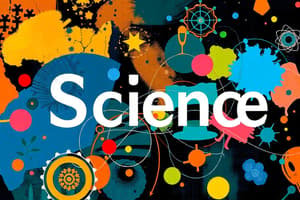Podcast
Questions and Answers
What is the primary focus of natural sciences?
What is the primary focus of natural sciences?
- Study of abstract concepts
- Study of societal institutions
- Study of natural phenomena (correct)
- Study of human behavior
Which of the following is NOT a step in the scientific method?
Which of the following is NOT a step in the scientific method?
- Observation
- Data visualization (correct)
- Peer review
- Hypothesis formulation
What is a key characteristic of a theory in science?
What is a key characteristic of a theory in science?
- A single observation
- A tentative explanation
- An untested hypothesis
- Well-substantiated explanation (correct)
Which branch of science studies living organisms?
Which branch of science studies living organisms?
What does the field of economics primarily analyze?
What does the field of economics primarily analyze?
Which of the following best describes the role of statistics in formal sciences?
Which of the following best describes the role of statistics in formal sciences?
What is the purpose of peer review in the scientific method?
What is the purpose of peer review in the scientific method?
What role does science play in public policy?
What role does science play in public policy?
Study Notes
Definition of Science
- Systematic enterprise that builds and organizes knowledge in the form of testable explanations and predictions about the universe.
- Involves observation, experimentation, and the formulation of theories.
Branches of Science
-
Natural Sciences
- Study of natural phenomena.
- Includes:
- Physics: Study of matter, energy, and forces.
- Chemistry: Study of substances and their interactions.
- Biology: Study of living organisms.
- Earth Science: Study of Earth and its processes.
-
Formal Sciences
- Study of abstract concepts and systems.
- Includes:
- Mathematics: Study of numbers, quantities, shapes, and patterns.
- Logic: Study of reasoning and argument structure.
- Statistics: Analysis and interpretation of numerical data.
-
Social Sciences
- Study of human behavior and societies.
- Includes:
- Psychology: Study of the mind and behavior.
- Sociology: Study of social behavior and institutions.
- Economics: Study of production, consumption, and distribution of goods.
Scientific Method
- A systematic approach to inquiry.
- Steps include:
- Observation: Gathering information and noticing patterns.
- Question: Asking questions based on observations.
- Hypothesis: Formulating a testable statement.
- Experimentation: Testing the hypothesis through controlled methods.
- Analysis: Interpreting data and results.
- Conclusion: Drawing conclusions based on the analysis.
- Peer review and publication: Sharing findings with the scientific community.
Importance of Science
- Enhances understanding of the universe and our place in it.
- Drives technological advancement and innovation.
- Informs public policy and contributes to evidence-based decision-making.
- Promotes critical thinking and fosters curiosity.
Key Concepts
- Theory: Well-substantiated explanation of an aspect of the natural world, based on a body of evidence.
- Law: Statement based on repeated experimental observations that describes some aspects of the universe.
- Hypothesis: Tentative explanation for an observation, which can be tested.
Interdisciplinary Nature
- Science often overlaps with engineering, technology, and mathematics (STEM).
- Collaborative efforts across disciplines lead to comprehensive understanding and solutions to complex problems.
Definition of Science
- Science systematically organizes and builds knowledge through testable explanations and predictions.
- Encompasses observation, experimentation, and theory formulation.
Branches of Science
-
Natural Sciences: Focus on natural phenomena and their mechanisms.
- Physics examines fundamental properties of matter, energy, and forces.
- Chemistry investigates substances and their interactions.
- Biology explores living organisms and their processes.
- Earth Science delves into Earth's structure and processes.
-
Formal Sciences: Concerned with abstract concepts and logical systems.
- Mathematics analyzes numbers, quantities, shapes, and patterns.
- Logic studies reasoning and argumentation structures.
- Statistics focuses on numerical data analysis and interpretation.
-
Social Sciences: Examine human behavior and societal structures.
- Psychology investigates mind functions and behaviors.
- Sociology studies social interactions and institutional frameworks.
- Economics explores goods' production, consumption, and distribution dynamics.
Scientific Method
- A structured approach for inquiry and experimentation.
- Steps include:
- Observation: Collecting data and identifying patterns.
- Question: Formulating queries based on observations.
- Hypothesis: Developing testable statements.
- Experimentation: Testing hypotheses with controlled methods.
- Analysis: Interpreting experimental data and outcomes.
- Conclusion: Summarizing findings from the analysis.
- Peer review and publication: Sharing results with the scientific community for verification.
Importance of Science
- Enhances comprehension of the universe and our role within it.
- Fuels technological advancements and innovation.
- Informs public policies by supporting evidence-based decisions.
- Encourages critical thinking and nurtures intellectual curiosity.
Key Concepts
- Theory: Comprehensive explanation of a natural phenomenon, supported by substantial evidence.
- Law: Descriptive statement derived from consistent experimental observations regarding the universe.
- Hypothesis: Preliminary explanation for an observation, subject to testing.
Interdisciplinary Nature
- Science interacts with fields like engineering, technology, and mathematics (STEM).
- Collaboration across various disciplines fosters comprehensive understanding and tackles complex challenges.
Studying That Suits You
Use AI to generate personalized quizzes and flashcards to suit your learning preferences.
Description
Explore the fundamental definition of science and its various branches including natural, formal, and social sciences. This quiz delves into the key concepts and disciplines that form the basis of scientific inquiry and understanding. Test your knowledge of how different fields contribute to our comprehension of the universe.




